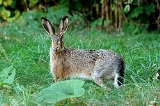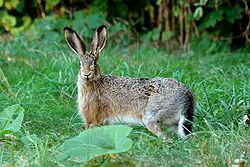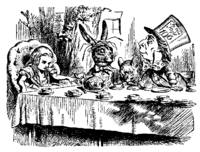
Mad as a March hare
Encyclopedia

English language
English is a West Germanic language that arose in the Anglo-Saxon kingdoms of England and spread into what was to become south-east Scotland under the influence of the Anglian medieval kingdom of Northumbria...
idiom
Idiom
Idiom is an expression, word, or phrase that has a figurative meaning that is comprehended in regard to a common use of that expression that is separate from the literal meaning or definition of the words of which it is made...
atic phrase derived from the observed antics, said to occur (some say incorrectly) only in the March breeding season
Breeding season
The breeding season is the most suitable season, usually with favourable conditions and abundant food and water, for breeding among some wild animals and birds . Species with a breeding season have naturally evolved to have sexual intercourse during a certain time of year in order to achieve the...
of the Hare
Hare
Hares and jackrabbits are leporids belonging to the genus Lepus. Hares less than one year old are called leverets. Four species commonly known as types of hare are classified outside of Lepus: the hispid hare , and three species known as red rock hares .Hares are very fast-moving...
, genus
Genus
In biology, a genus is a low-level taxonomic rank used in the biological classification of living and fossil organisms, which is an example of definition by genus and differentia...
Lepus. The phrase is an allusion that can be used to refer to any other animal or human who behaves in the excitable and unpredictable manner of a "March hare".
Historical development of the idiom

Europe
Europe is, by convention, one of the world's seven continents. Comprising the westernmost peninsula of Eurasia, Europe is generally 'divided' from Asia to its east by the watershed divides of the Ural and Caucasus Mountains, the Ural River, the Caspian and Black Seas, and the waterways connecting...
is the month of March (but which in fact extends over several months beyond March). This odd behaviour includes boxing at other hares, jumping vertically for seemingly no reason and generally displaying abnormal behaviour. An early verbal record of this animal's strange behaviour occurred in about 1500, in the poem Blowbol's Test where the original poet said:
- Thanne þey begyn to swere and to stare, And be as braynles as a Marshe hare
Similar phrases are attested in the sixteenth century in the works of John Skelton
John Skelton
John Skelton, also known as John Shelton , possibly born in Diss, Norfolk, was an English poet.-Education:...
(Replycacion, 1528: "Aiii, I saye, thou madde Marche Hare"; Magnyfycence, 1529: "As mery as a marche hare"). A later recorded use of the phrase occurs in the writings of Sir Thomas More
Thomas More
Sir Thomas More , also known by Catholics as Saint Thomas More, was an English lawyer, social philosopher, author, statesman and noted Renaissance humanist. He was an important councillor to Henry VIII of England and, for three years toward the end of his life, Lord Chancellor...
(The supplycacyon of soulys made by syr Thomas More knyght councellour to our souerayn lorde the Kynge and chauncellour of hys Duchy of Lancaster. Agaynst the supplycacyon of beggars: "As mad not as a March hare, but as a madde dogge."
Although the phrase in general has been in continuous use since the 16th century, it was popularised in more recent times by Lewis Carroll
Lewis Carroll
Charles Lutwidge Dodgson , better known by the pseudonym Lewis Carroll , was an English author, mathematician, logician, Anglican deacon and photographer. His most famous writings are Alice's Adventures in Wonderland and its sequel Through the Looking-Glass, as well as the poems "The Hunting of the...
in his book Alice's Adventures in Wonderland
Alice's Adventures in Wonderland
Alice's Adventures in Wonderland is an 1865 novel written by English author Charles Lutwidge Dodgson under the pseudonym Lewis Carroll. It tells of a girl named Alice who falls down a rabbit hole into a fantasy world populated by peculiar, anthropomorphic creatures...
, which has the March Hare
March Hare
Haigha, the March Hare is a character most famous for appearing in the tea party scene in Lewis Carroll's Alice's Adventures in Wonderland.The main character, Alice, hypothesises,...
as one of its main characters.

